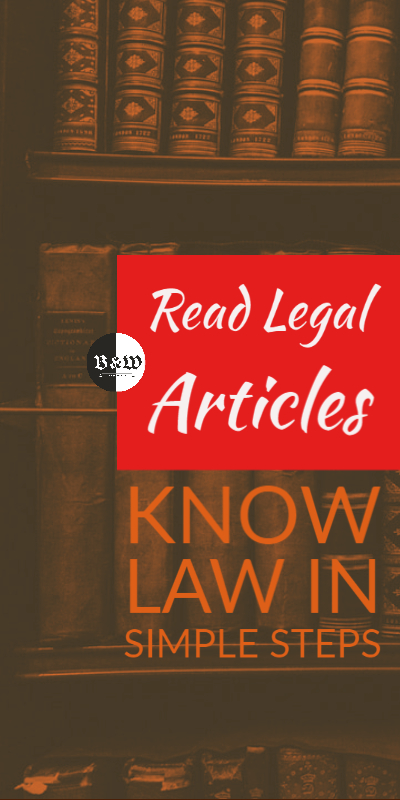What To Do If The Police Has Refused To Record The FIR | अगर पुलिस ने एफआईआर दर्ज करने से इनकार कर दिया है तो क्या करें
Non Registration of FIR is dereliction of duty by Police officer. Getting Court’s direction to register FIR in case of Cognizable Offence.
Non Registration of FIR is dereliction of duty by police officer
(V. Ravi Kumar vs State, 2018 (4) Crimes 599 (SC))
Definition of Offence
Offence is broadly an action that mandates a punishment under penal code.
Cognizable offence is essentially that the kind of offence, for which the penal code allows police officer to arrest the offender or accused without warrant. Contrary to the cognizable offence, the penal code restricts the police office to arrest the offender or accused in a non-cognizable act without a valid warrant. The police are also forbidden to start investigation in non-cognizable offence without the permission of court. Reference: Section 2 [r] Cr P C.
Cr. P. C Sections & Terminologies Related to FIR for Criminal Offences
Punishable Offence: In Section 2 (n) Cr. P. C Offence means a criminal act by commission or omission which is punishable by law
Police Station: Place or post declared generally or specifically by State Government being a police station, and includes the local area specified by the State Government
Officer – in – Charge: is the police officer present at the station house or other who is in charge of the police station, who is next in rank to such officer, but above the rank of constable.
Police Report: The report forwarded by police officer to a magistrate under Section 173 Cr. P. C / subsection (2).
Essential Constituent of FIR & Underlying Compulsion
Basic Format of an FIR: An FIR is a written format of information stating the commission of an offence. Even the oral information or statement can be transformed in a written statement.
Concise & Precise Written Information: FIR shall essentially contain the information of cognizable offense in a concise format, without unnecessary elaboration. The FIR shall contain the information of occurrence of a cognizable offence, which means, every information given to a police officer about the commission of a crime, shall be reduced in writing by him or under his direction, which finally should be read to the informant. [State of MP v Chhaaki Lal, 2018 (2) SCC ( Cri) 478] >> is an essential guideline for FIR to not include any minute details.
Signature by Informant: Every such information, whether given in writing or reduced to writing as aforesaid, shall be signed by information giving it.
Role of Police Officer in Registering FIR:
- Maintaining Substance Entry in Book: Police officer must enter or must ensure the entry of the substance of information in a book, which is kept by such officer. The format of the book is prescribed by State Government
- Referring the information to Magistrate { Section 155 (1), Cr. P. C } : The police officer must refer the information to a Magistrate within 24 hours as per Section 155 (1), Cr. P. C
How Much the Law Emphasizes & Necessitates the Registration of FIR
The law has given considerable emphasis; time and again that police officer has no alternative than registering an FIR for cognizable offence. Here are some notable arguments given by the learned counsels and solicitor generals on the necessity of transforming the information into an FIR by police, summarizing that there is no room for any excuse by police officer in not registering an FIR related to the commission of a cognizable offence.
|
Counsel’s Argument |
Decision Relied on Cases |
|
Section 154 (1) mandates that there is no discretion left to police officer except to register FIR |
B. Premanand and Ors. vs. Mohan Koikal and Others (2011) 4 SCC 266; M/s Hiralal Rattanlal Etc. Etc. vs. State of U.P. and Anr. Etc. (1973) 1 SCC 216 and
Govindlal Chhaganlal Patel vs. Agricultural Produce Market Committee, Godhra and Ors. (1975) 2 SCC 482.
Bhajan Lal (supra), Ganesh Bhavan Patel and Another vs. the State of Maharashtra (1978) 4 SCC 371;
Aleque Padamsee and Others vs. Union of India and Others (2007) 6 SCC 171;
Ramesh Kumari (supra), Ram Lal Narang vs. State (Delhi Administration) (1979) 2 SCC 322
Lallan Chaudhary and Others vs. the State of Bihar and Another (2006) 12 SCC 229. |
|
Mr. K.V. Viswanathan Learned Additional Solicitor General appearing on behalf of Union of India
All the cases where information is received under Section Cr.P.C, it becomes mandatory for the police to enter the same information into the register maintained which is maintained by police officer for entering substance of commission of a cognizable offence. The Addl Solicitor General also argues that the police authorities have no authority to ascertain the veracity of such information before deciding to register it. The verification of such information shall be done after registering the FIR. The Addl Solicitor General also states that according to law (Section 156 & Section 157) the police officer, who proceeds to the spot relying on the information received from any source even its rumour, is bound to send a report to police station about the commission of a cognizable offence. This information may be transformed into an FIR. . |
Bhajan Lal (supra), Ramesh Kumari (supra) and Aleque Padamsee (supra).
Deliberations were done on the basis of distinguishable judgments in conflict with the mandatory proposition, viz., State of Uttar Pradesh vs. Bhagwant Kishore Joshi (1964) 3 SCR 71, P. Sirajuddin (supra), Sevi (supra), Shashikant (supra), Rajinder Singh Katoch (supra), Jacob Mathew vs. State of Punjab & Anr. (2005) 6 SCC 1. |
|
Kalyan Bandopadhaya Learned counsel appearing for Govt of West Bengal The learned counsel clearly states that whenever an information about commission of a crime is received, it is the duty of Police Officer (in charge of Police Station), under Section 154 (2) to record the same information as FIR. Also it is the duty of police officer to provide the copy of FIR to informant, without involving any cost (Free of Cost) |
H.N. Rishbud and Inder Singh vs. State of Delhi AIR 1955 SC 196, Bhajan Lal (supra),
S.N. Sharma vs. Bipen Kumar Tiwari (1970) 1 SCC 653, Union of India vs. Prakash P. Hinduja (2003) 6 SCC 195, Sheikh Hasib alias Tabarak vs. State of Bihar (1972) 4 SCC 773, |
|
R.K. Dash Senior Learned Counsel – Appearing for State of Uttar Pradesh
There is no doubt that FIRs do have potential to cause unnecessary harassment to innocent persons at the behest of unscrupulous complaints. But after considering the salient provisions of the Code, like Sections 2(4) (h), 156(1), 202(1), 164 & UP Police Regulations, the counsel has pleaded that registration of FIR should not be deferred till verification of the truth or otherwise of the information is obtained. |
|
|
Siddharth Luthra Additional Solicitor General – Appearing for Chandigarh
The police officer has power to conduct a preliminary enquiry before registering a FIR, mostly for the offences of the nature – matrimonial, commercial, medical / medical negligence, corruption etc, under SECTION 154 Cr. P.C. . |
|
A Conclusion on Registering FIR u/s Section 154
The usage of word SHALL in the section 154, intends to be applied in its original meaning, implying that registration of FIR is mandatory for Police Officer for a cognizable offence. The word give a mandatory character and becomes a statutory scheme, which strips down the discretionary power of a Police Officer in registering an FIR.
Steps for Person Aggrieved by Refusal of Police to Record First Information Report (FIR)
- SECTION 156 (3) Cr. P.C. Enablement: Approach Chief Judicial Magistrate or Metropolitan Magistrate to seek direction to the officer in-charge. The police officer / officer in-charge is bound to lodge an FIR on receipt of such direction by magistrate u/s 156 (3) Cr. P.C. Magistrate is under legal duty to issue direction u/s 156(3) Cr. P.C, if the allegation discloses a cognizable offence.
- SECTION 154 (1) Cr. P.C Enablement: Send the substances of such information, in writing or by post to Superintendent of Police, concerned, who if satisfied that the information discloses a commission of a cognizable offence, shall either investigate himself, or direct the investigation to be done by any police officer subordinate to him. Such subordinate officer will be considered to have all the powers of an officer in-charge of the police station in relation to the offence.






Test1, 2020-11-18 07:39:48
this is a comment for testing on this article 12345.